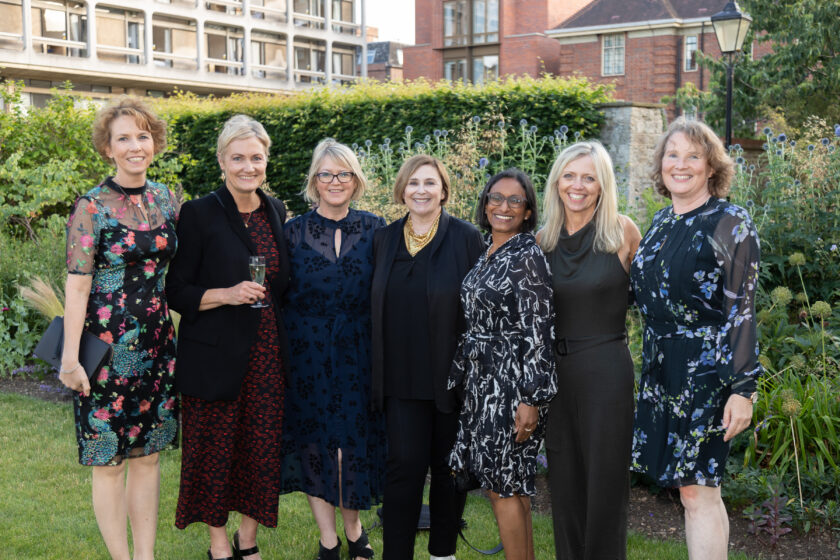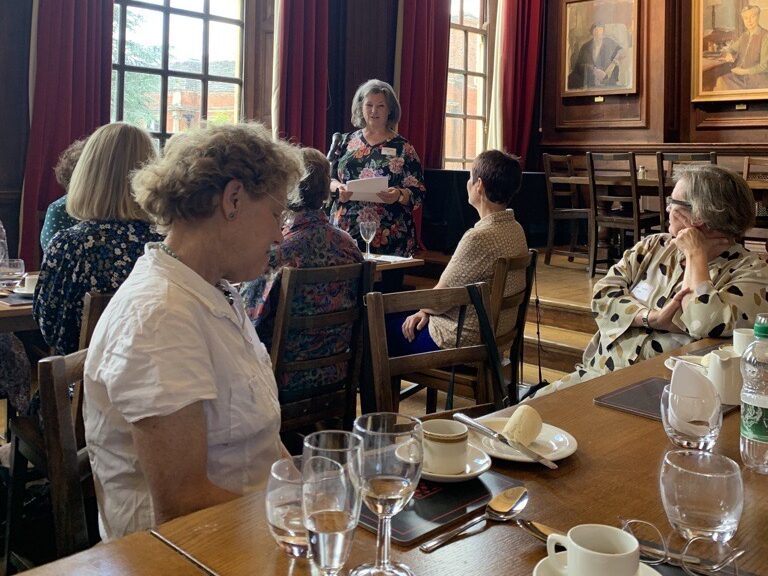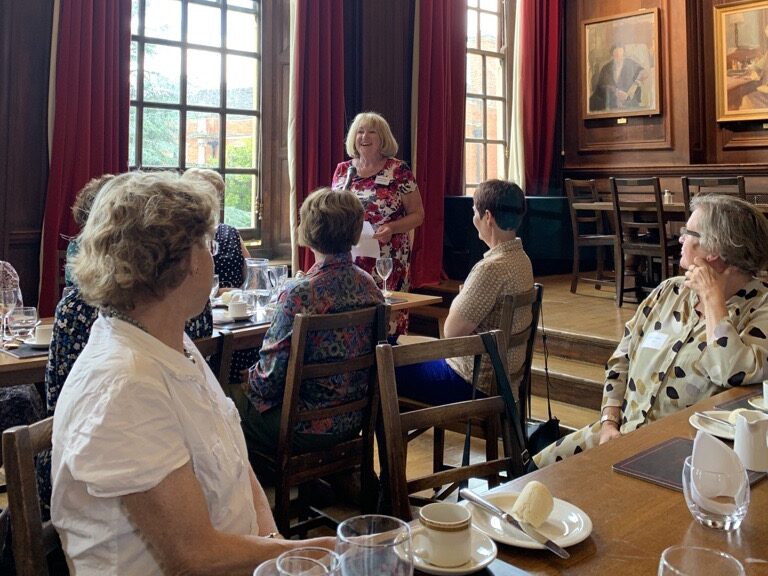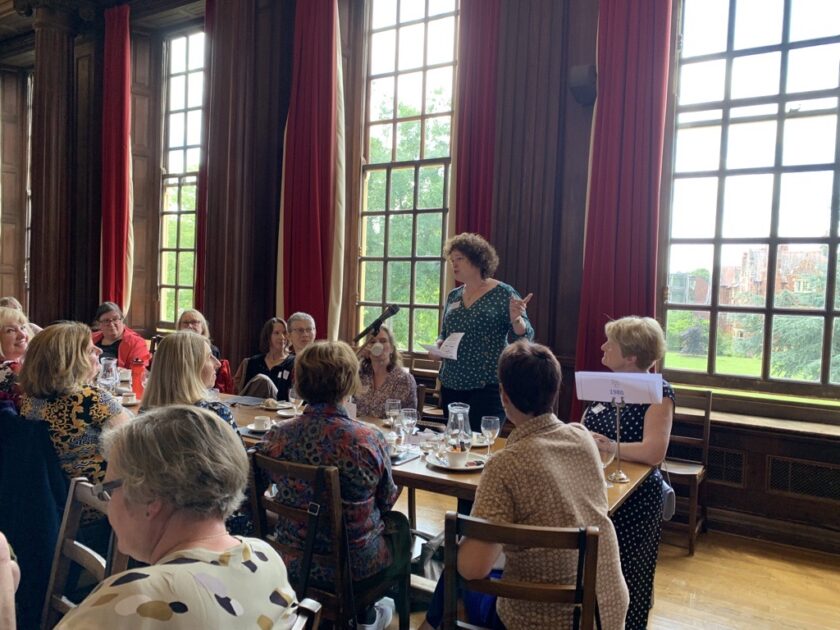From saving up your 2p pieces to phone home (only, of course, once you made it to the front of the queue) to rescuing your credit card from a jackdaw, and from the inspirational figure of Daphne Park to reflections on the final years of single-sex education at Somerville; our guest alumni speakers shared treasured memories and keen insights at the 1980-91 gaudy. Here are their speeches, reproduced in full:
Elenore Falshaw (1987, English)
Baroness Royall, Honored Guests. Well, this is a unique perspective. In my very undistinguished time at Somerville I never sat at High Table and I must say this view is lovely, especially as everyone present has not aged a day. In this room I developed a lifelong taste for stone cold toast, done on one side only, and realized how distinctive my northern vowel sounds were when I called out to ‘Jo Roscow’.
The greatest gift Somerville gave me were my friends. I am a proud member of the Somerville 6. Not a crime gang or a terrorist organization, but a group of 5 girls from the North of England plus Irish Lisa Gygax. For 35 years these women have been friends, sisters, travel companions, dancefloor champions, counselors, godparents, potential organ donors – maybe not the liver this weekend – in short, a lifelong blessing. I know you have your own versions of the Somerville 6 and are probably swapping stories and memories, one of the joys of events like these. After dinner tonight we plan to make some more at the Bop – please join us to see if Lisa’s knees are still up to some of her legendary dance moves. Jo, Pri, Liz, Joanne and Lisa, thank you for being a joy to my life.
While I realized in the first two minutes at college that I had reached my intellectual peak at A levels, what a thrill it was to be here. I had visited in Trinity term and had a meal at Brown’s surrounded by girls in ballgowns and boys in black tie. It was impossibly glamorous and I wanted in. From the moment I had my interview with Daphne Park I desperately wanted to come to Somerville – not Oxford generally, Somerville in particular. I wanted to be in the company of women like her. Heather O’Donohue telling me I had a cool writing style consoled me for not being FR Leavis, and Katherine Duncan-Jones grace and kindness will stay with me forever. It was good to take a lesson in humility here after being “the best” at a small school – listening to Helen Beech and Jane Linstead in tutorials I was gobsmacked by their intellect – but at the time I didn’t know the life long calling card Oxford admittance gave me, especially after moving to the states. This is the second gift I am thankful to Somerville for. Not just the cachet of the name but the opportunity I had to be around minds much greater than my own. Things may have changed but I recall it wasn’t the done thing to say you went to Oxford when we were here, instead we would mumble we went to ‘college’. Silly girl. Now, if I reach for a Bridgerton instead of an Elena Ferrante I can remind myself I once read Dream of the Rood in Old English and give myself a pass.
Speaking of Daphne Park, at my interview she asked me why I chose Somerville. I didn’t want to tell her ‘because my headmistress told me to’, so after a moment of panic, not the last I’d have, I stumbled on to describe what has turned out to be a defining principle of my life. I truly believe in the transformative power of single sex education spaces for girls and women. I went to an all-girls’ school, a women’s college, worked first in publishing and for the last 18 years back in an all-girls’ school in New Orleans. I have clearly drunk the single sex kool-aid. Back to that winter evening interview, Daphne considered my answer and gave me a little smile and a nod and always afterwards remembered my name – I hero-worshipped that woman. When we later learned that her career in the Foreign Service included espionage, as we had always suspected, my crush was complete. A Margaret Rutherford shaped 007 with the intelligence of ten men – take that Ian Fleming.
So I was a little miffed when shortly after we had graduated the decision to let men attend was made. C’est la vie!
Carry on Somerville – from reading the college’s excellent publications, following your just-right social media accounts, hearing updates from Liz and Lisa on alumni affairs, there is so much to be proud of, from helping lead the fight against COVID-19 to becoming a College of Sanctuary. The college looks amazing, with all the new buildings and improvements. I am staying in the lovely Catherine Hughes Building, with an en suite, very smart. There will be no buildings named for me but I work in development and know the difference that small bequests make cumulatively for the future of great institutions like Somerville so do consider this. I owe this college so much, not least an apology for you having to repaint my room in Vaughan after first year as 3 of the Somerville 6 were smokers and I had a telly in my room.
Thank you for your leadership Jan. Even though I wouldn’t have a chance in hell of getting in these days, and even though there are boys here, I would apply here all over again.
To Somerville!

Elenore Falshaw (centre) at the gaudy, joined by friends including members of the Somerville 6
Pia Pasternack (1982, Philosophy and Mod. Languages)
It’s a funny feeling, isn’t it, stepping back in time, meeting for a meal in the old dining hall, more or less the same portraits, more or less the same echoes and smells, and as I look round today, more or less the same people. Just a bit older.
I have very happy memories of my time at Somerville, and at Oxford. It was all so exciting, being away from home, responsible for my own laundry with no one to notice what time I went to bed or got up, meeting so many different people, learning and stretching my mind. All this novelty could have been overwhelming, but at Somerville, I felt held.
Meeting Somervillians, we mostly talk about the present and future, but – suffering this essay crisis last night – I reminisced:
About queuing for the phone at the end of the hall, and running out of 2p bits (or pretending to),
About embarrassments at fire alarms in the night, whether unauthorized boyfriends (other people’s!) were produced or left to risk being burnt to a cinder.
Or indeed the time two fire engines disgorged loads of burly firefighters who trooped into the quad with hoses only to discover that the source of the flames seen flickering dangerously was a few Divali candles burning harmlessly on someone’s windowsill.
About the quaint system of battels or indeed the pigeon post.
Some things have changed no doubt – I daresay there are apps for everything – and you’ll have noticed new buildings and extra levels of security including a new glass door at the porter’s lodge, which gave me quite a shock. It’s probably true of some of you as well: I did not apply to a women’s college. I didn’t relish the thought of being ‘stuck with a load of women’ at university. As it turned out, I wasn’t. I went for tutorials in other colleges, and to lectures and libraries, debates and parties.
And then I came back to Somerville. One can tolerate or even welcome the introduction of men to one’s college – a hot topic when we were students – and at the same time retain a great fondness and nostalgia for the special camaraderie, the warm and supportive base that we found in the single sex Somerville of the 80s.
On graduation, we spread our wings further, out in the world. I know many still have firm friendships that have survived from that day to this. I drifted from many of mine as I worked long hours and travelled for work and study. And partied, and got involved in new relationships. Life became busier still with careers and children, social life often revolving around connections made at work and at the school gates.
From time to time I’d get post or an email from Somerville. I’d look wistfully at lists of events for lawyers or medics or those in the City. A stay at home mum by that time (international travel being incompatible with family life), I felt there was nothing for me, and that I had let the side down because I was ‘just a mum’. I’d come to Oxford from time to time, bring my children to have a look around, visit the Pitt Rivers Museum, and identify locations from the Harry Potter franchise, but I lost touch with my old college.
Years later, divorced and with older children no longer requiring much attention, a post on Facebook caught my eye. Somebody (it may have been Ruth, whom I did not know) was saying that some other person I didn’t know had not read ‘Testament of Youth’; would anyone like to read it and meet to discuss? Yes please! A handful of us gathered round a table in the corner of a crowded pub. I was conscious that my brain had turned to porridge in the intervening years and felt I had nothing to say, though I’d loved the book when I was an undergraduate, I loved it less second time round. At the end of the evening I felt both exhilarated and completely at home with this group of Somervillians spanning all ages, who hours ago had been strangers to me. ‘This was so much fun’ I said. ‘Can we do it again?’
This was, when? 4, 5 years ago? And through what became the London Somerville book group (open to Somervillians and reading books by Somervillians – yes, it is quite exclusive!) I found my way back to the college. I’ve attended talks and walks and events. I’ve joined the Committee as year rep for my cohort, so meet regularly in London, online, or back here in College, with a variety of Somervillians past and present, students and staff. It is a huge pleasure to be a part of it again.
The Somervillians I have been lucky enough to connect with in this stage of my life are high achievers who bring their vast and varied experience and their intellects to bear on the books we discuss, or – on the reps’ committee – on questions about Somerville’s communications with its alumni, and about its students past, present and future. But it’s more than that. They are women with whom I share a certain history, a certain curiosity, and good intentions. I am in awe of them, and I love their company. They make me think (and read) and they make me laugh. They make me proud to be a Somervillian.
The book group continues to meet. It provided a lifeline via Zoom during lockdown, and the members are now friends. When – rarely – we have occasion to introduce ourselves, and I hear these marvelous women state, for example, ‘I came up to read Chemistry in 1961’ I can’t tell you the thrill it gives me to reflect that this was before I was born, and that I form part of a chain, not just in the book group, but in the history of the college and the education of women. I never forget what privilege this is. And how important it is for us to continue the tradition, to keep it alive, to broaden the franchise, to include those traditionally excluded from a first class education. Whether by their sex, or their social or economic background. I have been delighted to learn of the many efforts, funds and initiatives directed at helping to open opportunities to those from underprivileged backgrounds here and abroad or fleeing war or revolution. I am proud to read about the support that was offered during the pandemic, and since, both financial and emotional, to those who aspire to study here, even if none of their family has ever been to university, and those who arrive, to help them not to feel out of place. They are not out of place: this IS the place for them.
Some of you here today may have kept your links with the college, others are perhaps returning for the first time in many years. I hope that you feel a kinship with all of us. The dining room has been spruced up and is looking in good nick for its age. So are we, by and large. It’s good to see you.

Pia Pasternack speaks at the 1980-91 Gaudy
Christine Kavanagh (1981, English)
On behalf of the class of ’81, I would like to thank Somerville for hosting this wonderful 40th anniversary lunch.
When we arrived at Somerville in 1981, Britain was in a volatile state with the poll tax riots during that summer. I had been working in Toxteth during those riots and felt my world had been turned upside down. Walking into this amazing quad that October, filled with flowers, sunlight and friendly faces felt like walking into paradise and that feeling of being safe and secure here is always with me whenever I come back.
I was a rather shy girl back then, keeping my opinions to myself and never doing any sport. Somerville changed me completely. By the end of my first term, I was rowing; an enthusiastic participant rather than being any good but that didn’t seem to matter. Everyone was encouraged to have a go. I even loved those early morning winter rowing outings as it meant I got to see the sun rise over the water while we were rowing and come back to a well-earned breakfast in hall, making sure I placed my hand over the toast in the toaster to make sure it was still warm as, if you took a slice, you couldn’t put it back even if it was stone cold.
Student politics was strong back then. The JCR meetings were always full, with worthy causes and charities being championed for JCR donations. I had never taken any interest in politics before but Somerville was full of people wanting to change the world for the better. Remember Pip O Neill and brown rice week in 5th week where we had a plate of brown rice instead of our dinner to raise money and awareness for the starving in Africa? People like Pip helped to make us appreciate our privilege and try to make the world a better place for those less fortunate.
The centre of our social world was the JCR with the bar and TV in the same room which made for some interesting discussions as to who had priority. The bar usually won as we made more noise, particularly on cocktail evenings and the legendary darts matches. I became darts captain in my first term, even though I couldn’t play. It was a good excuse to bring teams in from other colleges and increase the bar takings and there were other benefits: we improved as darts players, naturally. Sarah Young has a particular reason to remember the match against Trinity college in the summer of ’82 as that was where she met her future husband David and they have recently celebrated 40 years of being together.
I can’t talk about Somerville life without mentioning Daphne Park. What a kind, thoughtful person she was and an inspiration to us all. She was the complete Miss Marple; she effused an air of pleasant good humour which disguised a steely determination to improve Somerville and make the college one of the best in Oxford. And boy did she succeed. I remember the reviews we had with her, scrabbling around to find my gown and dashing off to see her. She would read out the tutor reviews and always put a positive spin on things so when you walked out of her office, you always walked out a bit taller, feeling better about yourself. Daphne encouraged us to do whatever we wanted. We even organised the first Somerville Mansfield ball where we saw the brilliant Bootleg Beatles and learnt the hard way how difficult it is to organise such a large event.
There was a wonderful chaos about Somerville; a can do, fearless attitude where anything was possible. I studied English but mainly hung around with the Chemists as they seemed to have the most fun after being stuck in the labs all day. It was a group of chemists who hired a minibus once a term to see the latest RSC productions at Stratford and I never missed a trip.
The JCR negotiated our own rents with college and the whole student body backed us in our attempt to get the formidable Jane Hands not to raise our rents in ’82. Ably led by Neeta Patel, we had several lengthy meetings with the SCR and had posters with 0% in the windows of the rooms overlooking the quad. We ended up with a 4% rise but that was so much better than the 10% rise the previous year and I learned a great deal about the art of negotiating from that experience.
That you are all here today is testament to how much Somerville has meant to us all over the years. I love this place and the people who were here and made it such a wonderful 3 years. Not only Daphne, but also Sue Cashman, Susan Partridge, our amazing tutors and our second mums, the Scouts who cleaned up our physical and emotional mess and were a shoulder to cry on when times were difficult.
Finally, I would like you all to raise a glass to Somerville and say a big thank you for today and for allowing us relive those wonderful times from so long ago.

Christine Kavanagh giving her 1980-91 Guady Speech
Ruth Crawford (1980, Law)
Isn’t it lovely to be back here and to see so many familiar faces, especially after the last couple of years. In some ways Somerville stays very much the same but it also very much keeps up with the times. I’d like to say a little about this and to share some memories.
Of course, the hall looks very familiar-though I believe there are new curtains. The older we get, the more principals we know on the walls and we move closer at these events to high table. I remember the bizarre effect of the principals’ portraits flashing in a disco’s strobe lights.
So what has changed?
The most obvious one is: Men! In our day we’d refer to Somerville for Women but in line with College’s inclusivity now we can refer to Somerville for All.
Back then we didn’t have mobile phones or the internet. Who remembers queuing for the payphone, in my case in the basement of Vaughan? We left notes on pads on each other’s doors and even wrote and received letters. It was a nice distraction from an essay crisis to go and check the pigeon holes. Of course, today we can use WhatsApp and social media to make our arrangements. The internet has huge advantages but in some ways we were lucky to be living very much in the here and now. I don’t see anyone here wearing rara skirts, pixie boots or leg warmers but please own up if you are!
There have been changes to the physical structure in College including lovely new student accommodation, a gym and the refurbishment of the dining facilities. But I have fond memories of the rather more spartan Vaughan with its minimal balconies. I was rather alarmed early one morning to be woken up by a croaky “’ello, ‘ello”” from the balcony, only to realise it was the jackdaw which terrorised the quad for a while, including swooping down on people and even stealing someone’s credit card from their hand! Someone had taught the bird to talk. I’ll say more about the jackdaw in a moment. Wolfson still looks the same and I enjoyed a room there for a year in what we called the goldfish bowls I got used to people commenting on what I was doing!
There are new student events including a bonfire and fireworks in the quad. This seemed so unlikely in our day that a few of us thought it would be funny to put up posters around College advertising a bonfire in the quad. We were rather worried when Daphne Park asked those responsible to own up but went along to see her only to find that she thanked us for the entertainment and gave us money to buy sparklers and refreshments!
And some things which haven’t changed:
The tradition of scouts continues. Does anyone remember Barbara in Vaughan? She certainly enjoyed a good chat.
And the porters continue to troubleshoot. This brings me back to the jackdaw. I was studying one night in my room in Vaughan when I heard a commotion from the room next door. It turned out that the jackdaw had flown in through the large open window. My friends tried to chase it out but as it repeatedly swooped towards them they ran out of the room and the jackdaw managed to get into the corridor after them. Now it was time to send for the porter who arrived armed with a cardboard box. The bird repeatedly flew up the stairs then down into the kitchen so the decision was made to shut the kitchen door and that the poor porter would go in after it. All we could hear was, “Bang! Bang! Squawk! Squawk!” But eventually the porter emerged with the bird in the box. The next day it could be seen looking rather bedraggled in a cage in the quad before it was taken away to be released in some woods.
On a more serious note, the College’s commitment to its founding values of including the excluded stays the same and it finds new ways of doing this. I thought I’d share a couple of examples which have struck me:
The College has supported sanctuary-seeking refugee students and academics since the 1930s. In 2021 it was accreditated alongside Mansfield as one of the UK’s first University Colleges of Sanctuary and was the first Oxford College to take the lead. It offers a number of scholarships for displaced students and hopes to expand this in future and to encourage the rest of Oxford to do the same. The College is also part of a university scheme to welcome Ukrainian refugees and a Ukrainian graduate will be arriving this autumn. There are more Inspiring Somerville sanctuary stories on the website.
There’s also the Covid hardship fund launched in 2020. The fund has allowed an unprecedented level of financial support to students when it was most needed.
I’ll end by saying how glad I am to be a Somervillian. In addition to being grateful for the opportunities it gave me, I’m also grateful to have met so many lovely people, that we’re all part of an ongoing community and to have made some lifelong friendships. I look forward to exchanging more memories over the weekend.

Ruth Crawford at the 1980-91 Gaudy